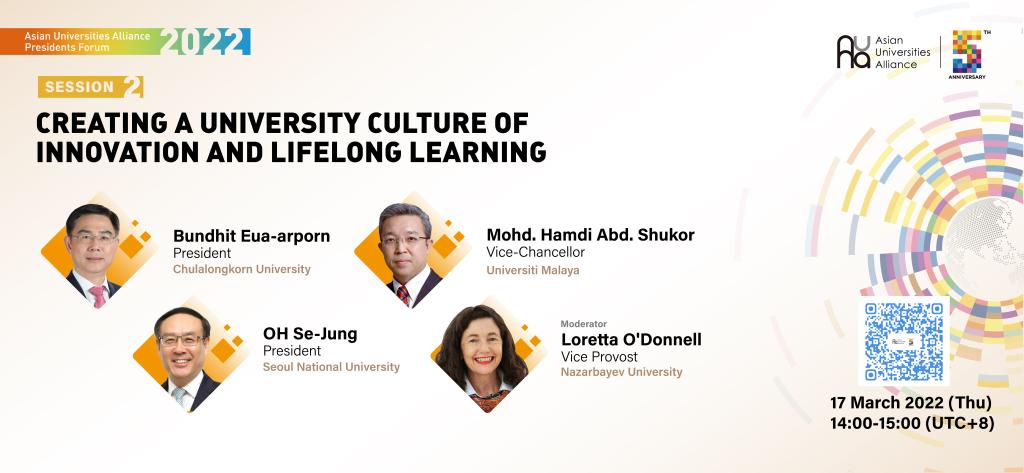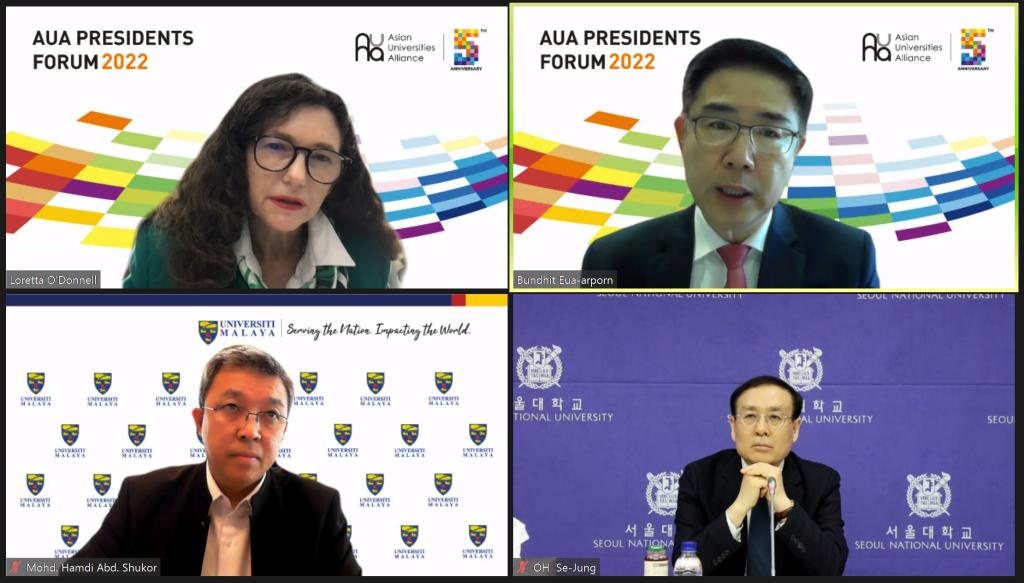
On 17 March 2022, AUA members convened for the second session of the Asian Universities Alliance Presidents Forum (AUAPF) 2022. This year’s AUAPF, themed “Embracing Asian Diversity for a Shared Future: Mission of Universities in Fostering a Community of Life for People and Nature”, explores the scope of advancement in higher education amidst new and profound challenges.
The second session, “Creating a University Culture of Innovation and Lifelong Learning”, engaged Prof. Bundhit Eua-arporn, President of Chulalongkorn University; Prof. OH Se-Jung, President of Seoul National University; and Prof. Mohd. Hamdi Abd. Shukor, Vice-Chancellor of Universiti Malaya. Dr. Loretta O’Donell, Vice-Provost of Nazarbayev University, moderated the session.

In a candid discussion, panelists deliberated the role and responsibility of universities in enabling a sustainable future for all, by cultivating lifelong learners and driving innovative solutions to common challenges. On the question of fostering a culture of innovation, President Bundhit discussed how the Chulalongkorn University Innovation Hub, since its launch in 2016, has created spinoff innovation enterprises, commercialized products at a faster rate, and changed the way projects are incubated and funded. The hub has incubated over 300 startups, benefiting over 2 million people and reaching over 52 provinces out of 60 in Thailand.
President Oh discussed how Artificial Intelligence Institute of Seoul National University, since its establishment in 2019, has boosted joint research among different disciplines and promoted collaboration between industrial and academic sectors. Additionally, SNU has embarked on an ambitious “2031 Initiative” aimed at significantly reorganizing the existing curriculum and education system into a more student-oriented one, where interdisciplinary studies are the norm rather than the exception.
For Universiti Malaya, the culture of research has transformed over the last 10 to 15 years from a primary focus on producing papers in high-impact journals towards creating more tangible impact. Vice Chancellor Hamdi believes that the university must strive to create more visible outcomes for society at large, including contributions to global SDGs and ESGs. To that end, UM is also allocating more efforts in promoting multidisciplinary research.
“Lifelong learning is the key to developing global citizens”, according to President Bundhit. The panelists all agreed that creating a culture of lifelong learning is essential to adapting to and solving global challenges. In an effort to overcome the challenges of long-distance learning brought by the pandemic, their universities have developed various online education programs. These include SNU’s Extension College, Center for Teaching and Learning, and Academy of University Administration, Universiti Malaya’s Centre for Continuing Education, and Chulalongkorn’s CU Neuron, CUVIP and Degree Plus.
While the panelists acknowledged the pandemic poses new challenges to innovation and lifelong learning, it has also brought many opportunities. According to President Oh, SNU created an integrated knowledge hub which shared latest updates and research about the pandemic with the public. SNU also launched online international summer programs which were well received by many students.
President Bundhit added that the pandemic has indeed accelerated lifelong learning, with a larger number of learners engaging in the online learning system. In terms of innovation, the research of Chulalongkorn University in the last two years was more oriented towards providing practical solutions related to COVID-19 challenges.
In Universiti Malaya, despite COVID-related lockdowns and temporary closure of the campus and labs, researchers managed to adapt to the challenges and continued their innovation effort. Vice Chancellor Hamdi also shared UM’s hybrid full-degree programs, which has enabled many international and adult learners to pursue their academic aspirations. Consequently, the capacity of these programs has also increased.
The session also addressed the need to adapt to the “mobile phone era”, ways to incentivize faculty members to contribute to lifelong learning, and content development for more engaging education programs. The insightful responses and wisdom shared by the panelists serve as a testament for lifelong learning in action, which many can learn from.
Previously, on 15 March, the first session of AUAPF 2022 explored “University Internationalization During and After COVID-19” with panelists from the University of Tokyo, Tsinghua University, and National University of Singapore.
Writers: Camilla Kong, Zoon Ahmed Khan